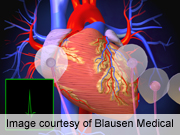- Fragments of Bird Flu Virus Found in 1 in 5 Milk Samples
- Clients Got HIV Through ‘Vampire Facial’ Microneedling Treatments
- Take the Stairs & Step Up to Longer Life
- ‘Drug Take Back Day’ is Saturday: Check for Leftover Opioids in Your Home
- Loneliness Can Shorten Lives of Cancer Survivors
- A Stolen Dog Feels Like Losing a Child, Study Finds
- Healthier Hearts in Middle Age Help Black Women’s Brains Stay Strong
- Better Scans Spot Hidden Inflammation in MS Patients
- Which Patients and Surgeries Are ‘High Risk’ for Seniors?
- Vancomycin May Be Losing Strength Against Common Deadly Infection
Surgery Might Top Drugs as First Therapy for Irregular Heartbeat: Study


Surgery works better, but has more serious side effects, than the standard drugs used to treat occasional bouts of atrial fibrillation, a new study reveals.
Atrial fibrillation is a condition where the heart’s normally precise electrical system goes out of whack, causing the upper chambers to beat rapidly and erratically. These fluttering heartbeats allow blood to pool inside the heart, increasing the risk for clots that may travel to the brain and cause a stroke.
The condition currently affects nearly 3 million Americans and is on the rise as the population ages, according to the U.S Centers for Disease Control and Prevention.
Guidelines advise doctors to use medications as a first step to get the condition under control.
“The medications have virtually no side effects. These are exceedingly well tolerated, simple, safe medications that have been around for 20 or 30 years,” said Dr. Hugh Calkins, director of the cardiac arrhythmia service at Johns Hopkins Hospital, in Baltimore.
But Calkins, who wrote an editorial on the new study but was not involved in the research, said that strategy comes with a catch: “The drugs only work in 40 to 50 percent of patients.”
The new study, published in the Feb. 19 issue of the Journal of the American Medical Association, was designed to see if surgery could be a reasonable first option for patients instead of medication.
Researchers randomly assigned 127 patients who were newly diagnosed with atrial fibrillation to either drug therapy or a surgical procedure called ablation.
In ablation, surgeons use a small, heated probe to destroy certain areas of the heart’s upper left chamber in a bid to block the faulty electrical signals, according to the U.S. National Heart, Lung, and Blood Institute.
For the study, patients ranged in age from 18 to 75, but most were in their mid-50s. They were also considered to be in the early stages of atrial fibrillation, where racing heartbeats usually ease up on their own, without the need to shock the heart back into its regular rhythm.
More than two-thirds of the 61 patients who started on medications took the drug flecainide, while another 25 percent took propafenone.
Sixty-six patients were assigned to get surgery as their first treatment, though one didn’t get the procedure.
Over the next two years, 44 patients (72 percent) in the medication group and 36 patients (54 percent) in the surgery group experienced an irregular and rapid heartbeat that lasted longer than 30 seconds. Surgery reduced the chances of having one of these episodes by 44 percent. Both groups experienced similar improvements in their quality of life.
But researchers said there are some important caveats to understand about surgery. First, they said, it’s not usually a permanent solution, and second, it’s not without serious risks.
“Ablation was better than medications as a first-line therapy, but by two years, about 50 percent of the people who had undergone one ablation had a recurrence of their symptoms,” said study author Dr. Carlos Morillo, a professor of cardiology at McMaster University in Ontario, Canada.
And he noted, there’s a 20 percent to 30 percent chance that an ablation may have to be redone because doctors didn’t zap all the right areas the first time around.
“We make people less symptomatic. They have less episodes, and we think the progression of the disease is delayed,” Morillo said.
But the surgery group had more serious negative events than the drug group. Overall, one in 11 patients who had the ablation had a serious complication. The most frequent problem was cardiac tamponade, caused when surgeons burned a hole through the wall of the heart.
Calkins said cardiac tamponade is a medical emergency, and although no patients died from it in this study, it can be life threatening. Previous studies have found that it’s the most common cause of death in patients who undergo catheter ablation.
“There’s no pressure sensor on currently available catheters to tell you how hard you’re pushing. So if you push too hard, you poke a hole in the heart,” Calkins said. “Then blood leaks out into the sac around the heart,” he explained.
That buildup of blood squeezes the heart, causing blood pressure to drop. “If untreated, you could be dead in 15 minutes,” Calkins said.
A study published in 2013 in the journal Circulation, which reviewed the outcomes of nearly 94,000 catheter ablation procedures, found an overall complication rate of just over 6 percent. About one in 217 patients who had ablations died in the hospital after their procedures.
For that reason, Calkins said he still thinks it’s wiser to start with medication. If drugs don’t work, he said, patients can feel good stepping up to surgery, which has become safer as doctors get more experience and have better tools to work with.
“For most people, I think that’s the better strategy,” Calkins said.
More information
Visit the U.S. National Heart, Lung, and Blood Institute for more on atrial fibrillation.
Source: HealthDay
Copyright © 2024 HealthDay. All rights reserved.









